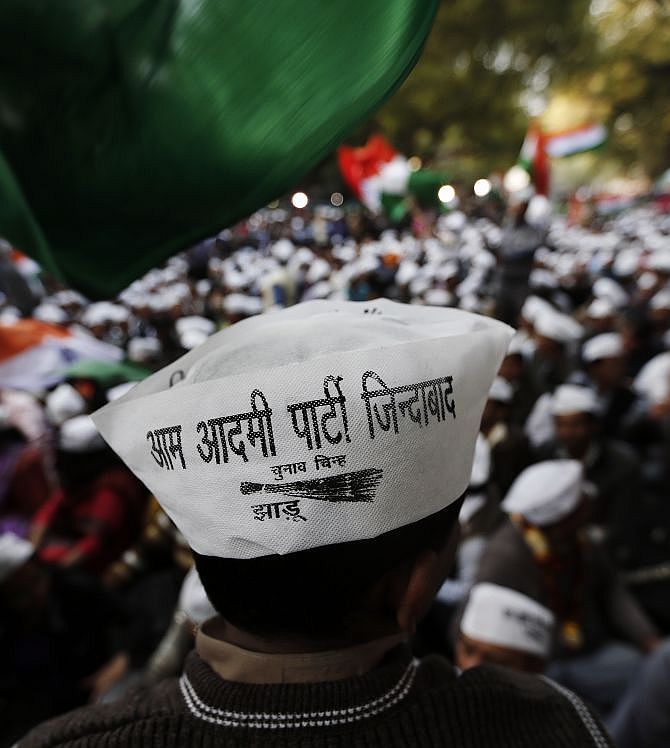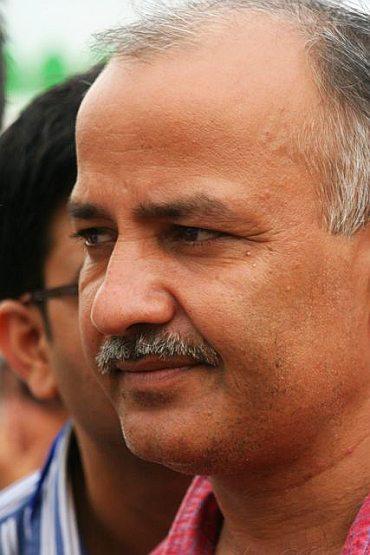'A set of encroachers are sitting in Delhi on a variety of things.'
'It is to remove and eliminate these encroachers that people have brought us to power. Winning the Delhi assembly elections was only part of the Aam Aadmi Party's greater vision for Delhi.'
'Before drafting the budget I went to mohalla sabha meetings -- the first such experiment in India.'
Everything about the way Delhi is governed needs to change, Delhi's Deputy Chief Minister Manish Sisodia tells Aditi Phadnis and Akshat Kaushal.

You have asked for a referendum on full statehood for Delhi. But there is no legal backing for it. It has no constitutional mandate. So anybody can hold a referendum and ask for anything but it doesn't mean much.
We can raise the same question when we vote -- that any state can vote for anything. The driving force of such arguments is that 'we don't believe in democracy'.
Those who say this have no idea of the strength and spirit of democracy. Before 1947, it used to be said that if we grant India independence, God knows what they will do to themselves. Even today, when we say the people should decide, there are gasps of disbelief.
Before drafting the budget I went to mohalla sabha meetings -- the first such experiment in India.
I invited all the members of legislative assembly and all the officers to come and see what people really want. They were surprised to see how wisely people took decisions and how honest these decisions were.
Second, our Constitution represents the biggest checks and balances on the system. So why don't you believe in the power of the Constitution?
The Constitution says nothing about a referendum
But the Constitution does not say that in this country people can do as they please. All meetings, referendum… all this takes place within the Constitution. My question to those asking these questions is: why even vote?
The people who say this do not believe in democracy. They don't know what democracy is.
There is a legal basis for voting. The Constitution provides for it
Where does the Constitution say that you cannot have a referendum? The country runs according to what the Constitution says -- and what it does not prohibit. Why are we scared of public opinion ? Those who are opposed to it are doing something the people do not want. Those who pay taxes to run the system -- why are we afraid of them?
You say you want a referendum. The people tell you something through the referendum. But you have no powers to act on their wishes. This can be a big loss of credibility
That is a secondary question. The first thing we have to address is this fear of public opinion.
 Your government is unable to do what is in its power to do; instead you are...
Your government is unable to do what is in its power to do; instead you are...
Who says ?
You have done nothing but quarrel with the Lieutenant Governor. The LG says you can't do this, you say we can. A former chief minister asked his chief secretary what his powers were. On realising he had no powers, he told him to bring a trowel so that he could at least weed the garden…
The people haven't sent us here to weed the garden. The people are smarter than all those pundits who claim they know the Constitution best. The people know that apart from police, land and public order, there is a government in Delhi, an elected government, which is authorised to do everything else. That is the reason we have been brought to power.
A set of encroachers are sitting in Delhi on a variety of things.
It is to remove and eliminate these encroachers that people have brought us to power. And that's what we are doing.
It is the most comfortable situation for corrupt people: the people go to the state government, it says go to the central government, they go to the central government, they say go to the state. They go to the municipal corporation and are asked to go to the state government. Each one has encroached on the work sphere of the other.
Didn't you know that you had limited powers when you made a bid for elections and forming a government?
We knew there were a few people -- encroachers -- who were sitting here just to confuse things. Ones who have created zones of comfort for themselves, despite clear constitutional provisions…
So these people are in contravention of the Constitution?
Of course they are! They are not following the Constitution at all.
Which section of the Constitution?
Article 229. Where does it say that services is part of (central) government?
The Constitution says police, land and public order...
For all these, we are ready to wage a struggle. But when they say services is under them, it is violative of the Constitution.
When you did your pre-Budget consultations with the people, what did most of them want?
Different areas wanted different things. In some areas, people wanted libraries while in some they wanted sewers. Others wanted roads, some wanted closed-circuit televisions (CCTVs). In some areas, they wanted action against stray dogs…
So what the majority of the people wanted should have reflected in your Budget. And in your Budget, the biggest outlay was for education.
Participatory budgeting was for only Rs 30 crore. But we were making the Budget for almost Rs 40,000 crore, and we took a recourse to ascertain what the people wanted. We took out advertisements in papers, held public consultations… and with a range of bodies including Confederation of Indian Industry.
But education was the first and foremost demand from almost every sector.
So far what have you managed to do in education?
We have started a credit guarantee scheme, especially for higher education. We are working on providing basic facilities to government schools. We have selected 152 schools, where we aim to change the ambience of studying. There is a lot of stagnation in education.
We want to give teachers training, we want to hold workshops, call people to give inspiring speeches… invite faculty to visit these schools, especially inspiring personalities... coach talented children…
How much money have you disbursed so far in the credit guarantee scheme?
The Vidhan Sabha approved our budget on June 30. The banks were waiting for the Vidhan Sabha to pass it. Now, we will start disbursing money.
So basic facilities to schools means?
CCTV in classrooms and outside, recruitment of more teachers...
Will these teachers be on contract or permanent?
Permanent.
In one area we visited, the biggest issue was water. People wanted tap water. But to lay pipes, you need powers over land which you don't have. This must lead you to innovate to provide facilities to the people?
I call it local solutions. If we can't lay water pipes, we will provide tankers. People come up with their own solutions. I have given people the freedom to do that. In schools, we have given school heads to solve their problems themselves.
You give money to the corporations. Then why are salaries not paid to the safai karamcharis and there is a mound of garbage every now and then because of it?
The corporations have to decide whether paying salaries is one of their priorities or not. They spend it on swimming pools, they spend it on councillors' fund. A lot of people know how it is spent. They have to find out how much tax is stolen and will have to increase collection of property tax…
But people won't like the increase in property tax...
You have to increase coverage. Not raise property tax.
Today no one pays property tax…
How much property tax is sought by the system? How many don't want to pay property tax? These bodies don't even have that data. They have no idea how many people pay and how many should pay. People are self respecting. If you ask them they will pay. But someone has to ask.












 © 2025
© 2025